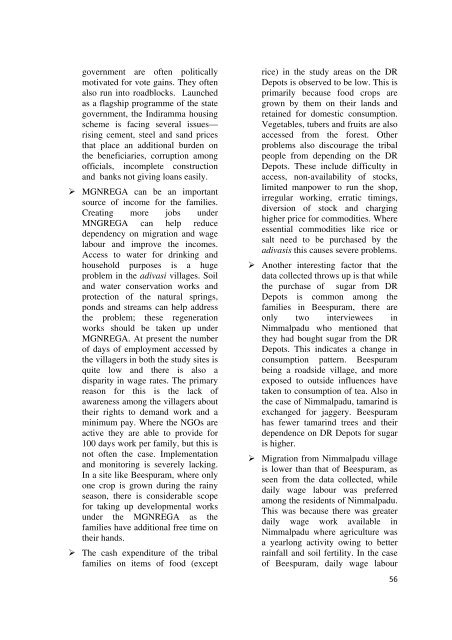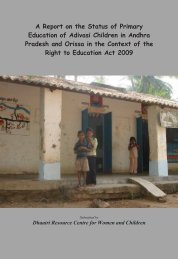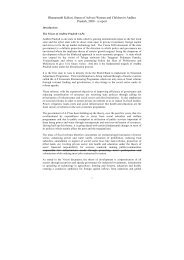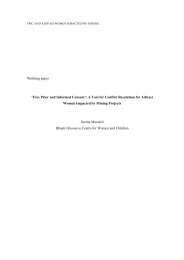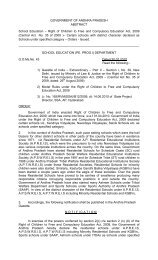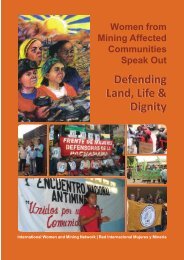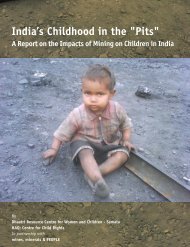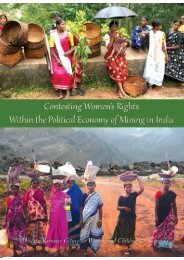Impacts of Government Policies on Sustenance of Tribal ... - Samata
Impacts of Government Policies on Sustenance of Tribal ... - Samata
Impacts of Government Policies on Sustenance of Tribal ... - Samata
You also want an ePaper? Increase the reach of your titles
YUMPU automatically turns print PDFs into web optimized ePapers that Google loves.
government are <str<strong>on</strong>g>of</str<strong>on</strong>g>ten politicallymotivated for vote gains. They <str<strong>on</strong>g>of</str<strong>on</strong>g>tenalso run into roadblocks. Launchedas a flagship programme <str<strong>on</strong>g>of</str<strong>on</strong>g> the stategovernment, the Indiramma housingscheme is facing several issues—rising cement, steel and sand pricesthat place an additi<strong>on</strong>al burden <strong>on</strong>the beneficiaries, corrupti<strong>on</strong> am<strong>on</strong>g<str<strong>on</strong>g>of</str<strong>on</strong>g>ficials, incomplete c<strong>on</strong>structi<strong>on</strong>and banks not giving loans easily. MGNREGA can be an importantsource <str<strong>on</strong>g>of</str<strong>on</strong>g> income for the families.Creating more jobs underMNGREGA can help reducedependency <strong>on</strong> migrati<strong>on</strong> and wagelabour and improve the incomes.Access to water for drinking andhousehold purposes is a hugeproblem in the adivasi villages. Soiland water c<strong>on</strong>servati<strong>on</strong> works andprotecti<strong>on</strong> <str<strong>on</strong>g>of</str<strong>on</strong>g> the natural springs,p<strong>on</strong>ds and streams can help addressthe problem; these regenerati<strong>on</strong>works should be taken up underMGNREGA. At present the number<str<strong>on</strong>g>of</str<strong>on</strong>g> days <str<strong>on</strong>g>of</str<strong>on</strong>g> employment accessed bythe villagers in both the study sites isquite low and there is also adisparity in wage rates. The primaryreas<strong>on</strong> for this is the lack <str<strong>on</strong>g>of</str<strong>on</strong>g>awareness am<strong>on</strong>g the villagers abouttheir rights to demand work and aminimum pay. Where the NGOs areactive they are able to provide for100 days work per family, but this isnot <str<strong>on</strong>g>of</str<strong>on</strong>g>ten the case. Implementati<strong>on</strong>and m<strong>on</strong>itoring is severely lacking.In a site like Beespuram, where <strong>on</strong>ly<strong>on</strong>e crop is grown during the rainyseas<strong>on</strong>, there is c<strong>on</strong>siderable scopefor taking up developmental worksunder the MGNREGA as thefamilies have additi<strong>on</strong>al free time <strong>on</strong>their hands. The cash expenditure <str<strong>on</strong>g>of</str<strong>on</strong>g> the tribalfamilies <strong>on</strong> items <str<strong>on</strong>g>of</str<strong>on</strong>g> food (exceptrice) in the study areas <strong>on</strong> the DRDepots is observed to be low. This isprimarily because food crops aregrown by them <strong>on</strong> their lands andretained for domestic c<strong>on</strong>sumpti<strong>on</strong>.Vegetables, tubers and fruits are alsoaccessed from the forest. Otherproblems also discourage the tribalpeople from depending <strong>on</strong> the DRDepots. These include difficulty inaccess, n<strong>on</strong>-availability <str<strong>on</strong>g>of</str<strong>on</strong>g> stocks,limited manpower to run the shop,irregular working, erratic timings,diversi<strong>on</strong> <str<strong>on</strong>g>of</str<strong>on</strong>g> stock and charginghigher price for commodities. Whereessential commodities like rice orsalt need to be purchased by theadivasis this causes severe problems. Another interesting factor that thedata collected throws up is that whilethe purchase <str<strong>on</strong>g>of</str<strong>on</strong>g> sugar from DRDepots is comm<strong>on</strong> am<strong>on</strong>g thefamilies in Beespuram, there are<strong>on</strong>ly two interviewees inNimmalpadu who menti<strong>on</strong>ed thatthey had bought sugar from the DRDepots. This indicates a change inc<strong>on</strong>sumpti<strong>on</strong> pattern. Beespurambeing a roadside village, and moreexposed to outside influences havetaken to c<strong>on</strong>sumpti<strong>on</strong> <str<strong>on</strong>g>of</str<strong>on</strong>g> tea. Also inthe case <str<strong>on</strong>g>of</str<strong>on</strong>g> Nimmalpadu, tamarind isexchanged for jaggery. Beespuramhas fewer tamarind trees and theirdependence <strong>on</strong> DR Depots for sugaris higher. Migrati<strong>on</strong> from Nimmalpadu villageis lower than that <str<strong>on</strong>g>of</str<strong>on</strong>g> Beespuram, asseen from the data collected, whiledaily wage labour was preferredam<strong>on</strong>g the residents <str<strong>on</strong>g>of</str<strong>on</strong>g> Nimmalpadu.This was because there was greaterdaily wage work available inNimmalpadu where agriculture wasa yearl<strong>on</strong>g activity owing to betterrainfall and soil fertility. In the case<str<strong>on</strong>g>of</str<strong>on</strong>g> Beespuram, daily wage labour56


